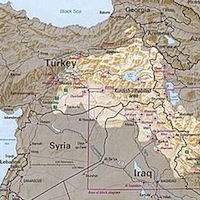A second round of US-led coalition airstrikes hit ISIS positions around Kobani on Tuesday, but the group had tightened the circle around the town down to two miles (down from about five or so on Saturday, when the first airstrikes hit), according to CNN:
Rear Adm. John Kirby, spokesman for the Pentagon, said U.S. airstrikes overnight hit the Syrian Kurdish town of Kobani.
A civilian inside Kobani, near the Turkish border, told CNN on Monday that ISIS was closing in.
The terror group is three kilometers (nearly two miles) east of the town, the civilian said on the condition of anonymity, basically confirming a report from the Syrian Observatory for Human Rights, a London-based monitoring group.
[…]
When asked why strikes in the Kobani area may appear to be limited, a senior U.S. official said — speaking separately on background — that factors which may make it appear that way include that the United States has no direct reliable intelligence on the ground and that precise and careful targeting is needed to avoid civilian casualties.
Meanwhile, on the other side of the Turkish border, Turkey’s government and military still seems to be weighing whether or not to become directly involved militarily in the civil war by crossing into Syrian territory — and perhaps weighing the long-term consequences of establishing and defending an autonomous Kurdish zone in northern Syria — but in any case they edged visibly closer toward intervention.
30 tanks and armored vehicles from a Turkish armored division have arrived at the border crossing with Syria within sight of where ISIS tanks and artillery have besieged Kobani. If the tanks cross the border, this would be the first time a foreign military’s ground forces have entered the fight against ISIS. The Turkish military reported that they fired on Syrian territory Sunday in response to ISIS shells landing on the Turkish side of the border, but so far no substantial action has occurred.
This may change if parliament approves an intervention, which is under discussion … or if ISIS forces directly attack Turkish troops — a scenario raised again this week by Deputy Prime Minister Bulent Arinc in relation to the Turkish Special Forces stationed at the Tomb of Suleiman Shah in an enclave near Aleppo. The tomb, guarded by Turkey’s military since 1938 under the terms of a 1921 treaty with France, has been repeatedly and publicly identified by ISIS as a target all year. ISIS may have hesitated to attack the Turkish enclave, given that a direct assault might trigger an automatic invasion of Syria by all of NATO, under Article V. Turkey beefed up security at the tomb significantly earlier in the year (rather than withdrawing), but the troops there are reportedly tenuously supplied due to deteriorating local conditions as the Aleppo region becomes the center of fighting between Turkish-backed Syrian Arab rebels, the Syrian government, and ISIS.
In another development at Kobani, the Turkish government says they will allow Syrian Kurdish fighters to cross from Kobani into Turkey if forced to cede the field to ISIS, but only without their weapons. This continues the balancing act between humanitarian responsibilities as a refuge and their fear of a disintegration of the ceasefire and peace talks with the Kurdish insurgency inside Turkey itself. The Syrian Kurdish fighters are viewed as a potentially destabilizing factor in the effort to make peace within Turkey.
Read more







